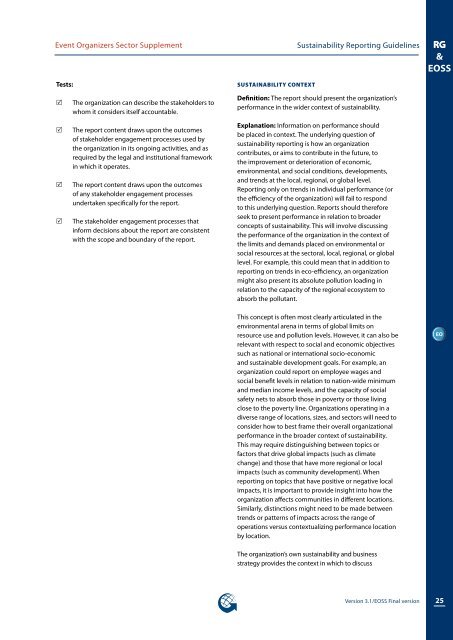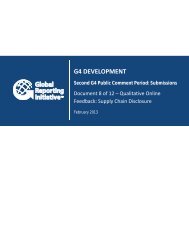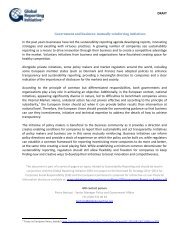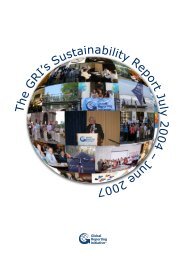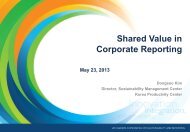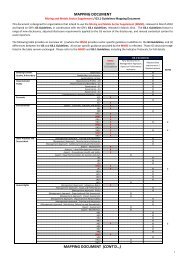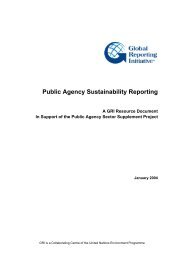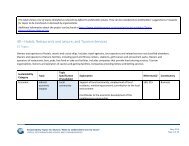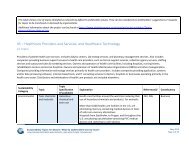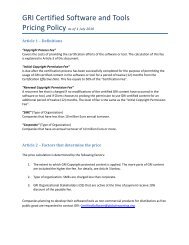Event Organizers Sector Supplement - Global Reporting Initiative
Event Organizers Sector Supplement - Global Reporting Initiative
Event Organizers Sector Supplement - Global Reporting Initiative
Create successful ePaper yourself
Turn your PDF publications into a flip-book with our unique Google optimized e-Paper software.
<strong>Event</strong> <strong>Organizers</strong> <strong>Sector</strong> <strong>Supplement</strong><br />
Tests:<br />
Sustainability Context<br />
Sustainability <strong>Reporting</strong> Guidelines<br />
RG<br />
&<br />
EOSS<br />
R<br />
R<br />
R<br />
R<br />
The organization can describe the stakeholders to<br />
whom it considers itself accountable.<br />
The report content draws upon the outcomes<br />
of stakeholder engagement processes used by<br />
the organization in its ongoing activities, and as<br />
required by the legal and institutional framework<br />
in which it operates.<br />
The report content draws upon the outcomes<br />
of any stakeholder engagement processes<br />
undertaken specifically for the report.<br />
The stakeholder engagement processes that<br />
inform decisions about the report are consistent<br />
with the scope and boundary of the report.<br />
Definition: The report should present the organization’s<br />
performance in the wider context of sustainability.<br />
Explanation: Information on performance should<br />
be placed in context. The underlying question of<br />
sustainability reporting is how an organization<br />
contributes, or aims to contribute in the future, to<br />
the improvement or deterioration of economic,<br />
environmental, and social conditions, developments,<br />
and trends at the local, regional, or global level.<br />
<strong>Reporting</strong> only on trends in individual performance (or<br />
the efficiency of the organization) will fail to respond<br />
to this underlying question. Reports should therefore<br />
seek to present performance in relation to broader<br />
concepts of sustainability. This will involve discussing<br />
the performance of the organization in the context of<br />
the limits and demands placed on environmental or<br />
social resources at the sectoral, local, regional, or global<br />
level. For example, this could mean that in addition to<br />
reporting on trends in eco-efficiency, an organization<br />
might also present its absolute pollution loading in<br />
relation to the capacity of the regional ecosystem to<br />
absorb the pollutant.<br />
This concept is often most clearly articulated in the<br />
environmental arena in terms of global limits on<br />
resource use and pollution levels. However, it can also be<br />
relevant with respect to social and economic objectives<br />
such as national or international socio-economic<br />
and sustainable development goals. For example, an<br />
organization could report on employee wages and<br />
social benefit levels in relation to nation-wide minimum<br />
and median income levels, and the capacity of social<br />
safety nets to absorb those in poverty or those living<br />
close to the poverty line. Organizations operating in a<br />
diverse range of locations, sizes, and sectors will need to<br />
consider how to best frame their overall organizational<br />
performance in the broader context of sustainability.<br />
This may require distinguishing between topics or<br />
factors that drive global impacts (such as climate<br />
change) and those that have more regional or local<br />
impacts (such as community development). When<br />
reporting on topics that have positive or negative local<br />
impacts, it is important to provide insight into how the<br />
organization affects communities in different locations.<br />
Similarly, distinctions might need to be made between<br />
trends or patterns of impacts across the range of<br />
operations versus contextualizing performance location<br />
by location.<br />
EO<br />
The organization’s own sustainability and business<br />
strategy provides the context in which to discuss<br />
Version 3.1/EOSS Final version<br />
25


